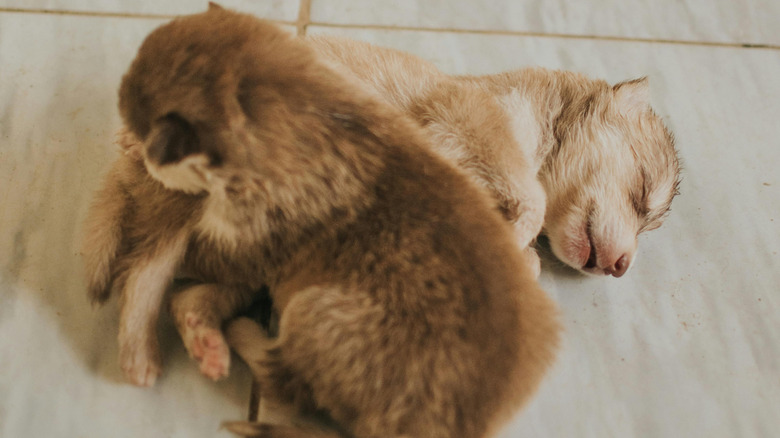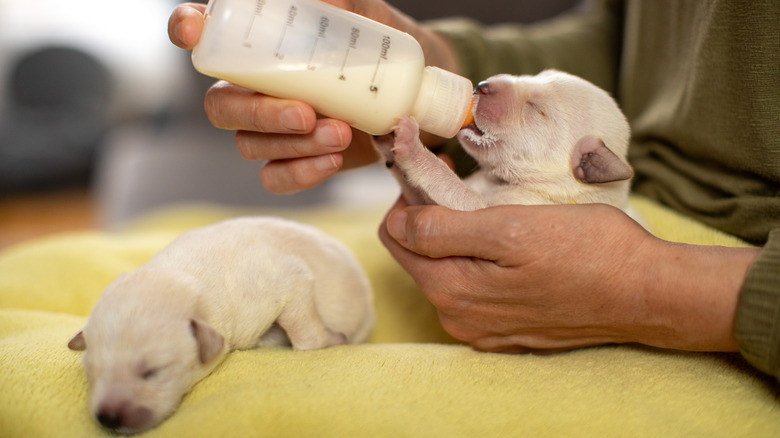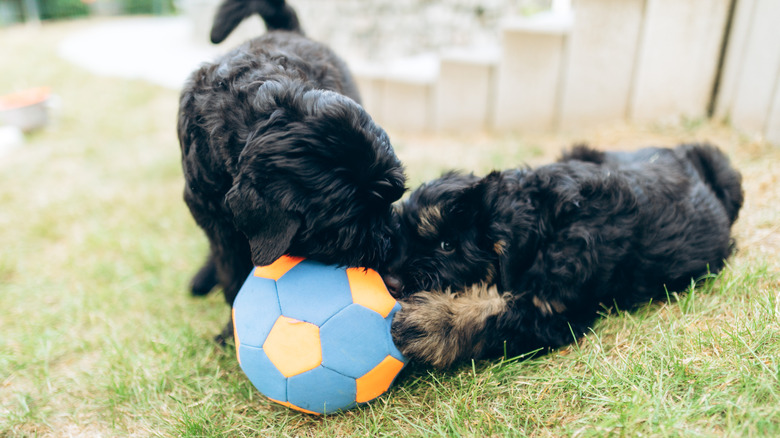Important Steps You Need To Take If A Dog Rejects Her Puppies
When a mother dog rejects her litter, the tiny lives in her care suddenly depend on you. While uncommon, this can happen for medical, behavioral, or environmental reasons, and spotting potential rejection early gives you the chance to step in before the puppies miss out on essential care. These signs might include the mom avoiding the whelping area for long periods, turning away during nursing, or neglecting the smallest or frailest pup. Such behaviors can leave newborns without the warmth or feeding they need.
Of course, not every sign is obvious. A mother that spends less time close to her pups or growls when they try to nurse may be showing signs of postpartum depression in female dogs, which can cause her to distance herself from the litter. In some cases, the cause isn't emotional at all — physical discomfort or illness could be to blame, especially if she seems lethargic or has stopped eating. Rejection can also stem from the mom's hormonal changes or health problems in the puppies. Sadly, behavioral issues can worsen if she had a cesarean section due to the lack of oxytocin production that comes with traditional birthing. Ultimately, spotting these triggers early gives you the best chance to support the mother and keep the litter safe and thriving.
Give the newborn puppies heat and milk
When a mother turns away from her litter, taking care of your new pup means acting fast to keep them warm and safe. Newborns can't regulate their body temperature, so you need to set up a warm, safe whelping environment with blankets, a low-heat pad, or a gentle heat lamp to help them stay warm and relaxed as they rest. Providing a cooler spot so they can move away from the heat if needed can be helpful, but check up on them regularly to make sure they're staying sufficiently warm, which is around 95 to 99 degrees Fahrenheit in their first week.
Once you've secured their warmth, the next priority is nutrition, as puppies can weaken quickly without nursing from their mother. Learning how to tell if your newborn puppies are getting milk helps you know when to step in with bottle-feeding so they receive the nourishment needed to fuel growth and support their developing immune systems. Choose the right formula, warm it to the correct temperature, and feed each pup in a safe position. Then, gently burp them afterward to help with digestion.
As you settle into a feeding routine, keep track of how much each puppy drinks so you can catch appetite changes early. If you notice a drop in intake, schedule a vet visit promptly — they can check for health issues, monitor weight gain, and offer personalized feeding advice to keep the litter nourished until it's time to wean them off of it.
Long-term care and monitoring for newborn puppies
In the developmental stages that follow those early weeks, rejected puppies still depend entirely on you. Their care gradually shifts from constant warmth and bottle-feeding to gentle weaning, early socialization, and routine health checks. Around 3 to 4 weeks old, you can start feeding puppies solid food in small, softened portions alongside milk feedings. Over the next few weeks, increase the proportion of solid food while continuing some milk feedings to let their digestive systems adjust. Most puppies are ready to be fully weaned off of milk by the 8-week mark. During this time, keep fresh water available in a shallow dish and observe how they handle the changes, making adjustments so the weaning process is as smooth and stress-free as possible.
As their appetite and energy improve, gradually expand their space to include a safe play area with age-appropriate toys, chew items, and opportunities for supervised exploration. Socialization should involve daily handling, exposure to everyday sounds, and, once it's safe, interactions with trusted visitors or healthy, vaccinated dogs to help them build trust and resilience. This stage is also a key time to meet emotional needs. Provide comfort and reassurance while avoiding the development of separation-related behaviors through gradual independence and positive early experiences. Paired with gentle support during new situations, these efforts help them grow into healthy, well-adjusted companions, even without their mother's early guidance.
Always consult your veterinarian before making changes to your pet's diet, exercise, or care. To find an accredited veterinarian in your area, you can search the American Animal Hospital Association's online database.


